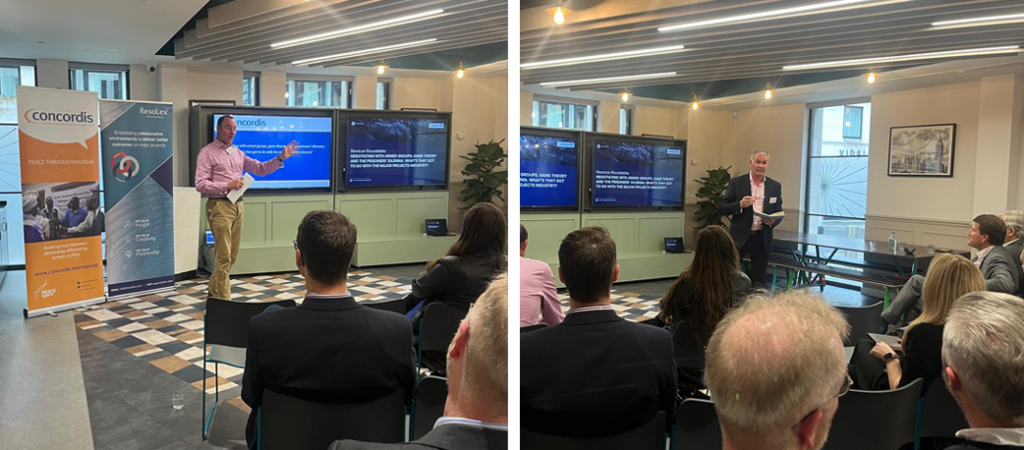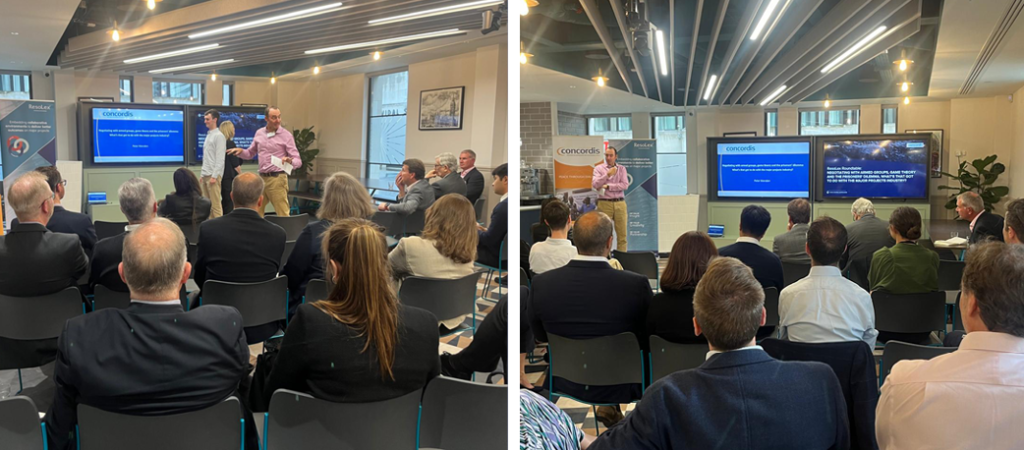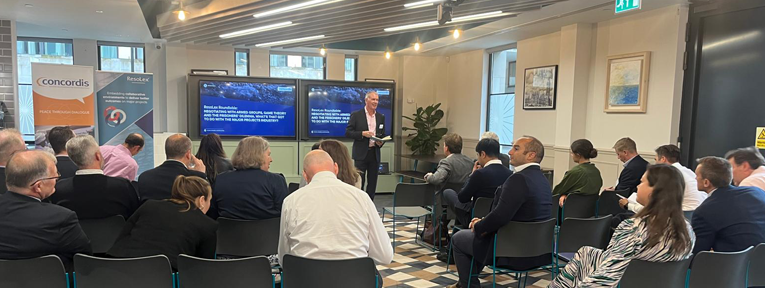On Tuesday 9th July, ResoLex hosted a roundtable discussion featuring Concordis International; a peacebuilding charity that uses dialogue to support the development of sustainable relationships among communities involved in or affected by armed conflict. The event was led by Peter Marsden, Chief Executive of Concordis International, and Edward Moore, Chief Executive of ResoLex and Chairman of Concordis International. The event allowed industry professionals to explore the complexities of building resilient and sustainable relationships in challenging environments. By drawing on lessons from the third sector, particularly in conflict negotiation, the session aimed to equip participants with strategies to enhance collaboration and resilience in the major projects industry.

The roundtable began with a thought-provoking question; if we can manage conflict and develop collaborative relationships between armed groups, then why do we struggle on major projects?
Peter opened by describing his work directly alongside those involved in, or affected by, armed conflict and how he helps to find collaborative, workable solutions that address the root cause. Similarly, in the major projects industry, there is an understanding of the need to develop collaborative working environments, yet we can often struggle to understand how to establish them. Providing an example, Peter shared his firsthand experience of meeting with a leader of an armed group. The leader arrived with 100 armed and angry individuals, creating an intense atmosphere, where Peter quickly needed to establish an escape route. Through the story, he came to the realisation that he was not in control, and emphasised the importance of meeting on the leader’s terms and relinquishing some of his power to establish trust and develop a relationship with the group.
Peter asked two people to join him for a demonstration. The two participants stood back-to-back and were given a scenario: denounce your partner and go free, stay loyal and receive one year in prison, but if both denounced, they got a five-year sentence. One participant denounced, while the other remained loyal, illustrating the complexities of trust and betrayal. The demonstration highlighted the impact of communication and on decision-making, as participants can learn from past experiences, understand each other’s behaviours, and build trust over time, creating expectations between the individuals involved.

Peter highlighted that each war comprises of a million decisions, influenced by incentives, constraints, opportunities, and threats. The goal is to convince people to adopt a long-term view of their relationships and move away from the instant gratification mindset prevalent in many projects. By understanding and influencing incentives, and addressing constraints, we can guide behaviours towards more collaborative and sustainable outcomes.
Peter’s stories underscored the importance of four key themes:
- Trust-Building: Meeting on others’ terms and understanding their perspectives are essential in creating trust and not creating power struggles.
- Communication and Repeated Transactions: Effective communication and repeated transactions can shift dynamics from adversarial to cooperative.
- Decision-Making in Conflict: Every conflict involves numerous decisions, each influenced by various factors. Understanding these can help create positive incentives and discourage negative behaviours.
- Long-Term View: Adopting and encouraging a long-term view is crucial for fostering trust and cooperation. The ability to communicate and anticipate future interactions can alter dynamics, promoting collaboration over conflict.
Relating Peter’s key themes to the major projects industry, Edward highlighted four key connections:
- Timeframe Orientation: Emphasis was placed on understanding how timeframes influence operations and relationship development. Unrealistic timelines often lead to negative behaviours and culture. Setting up projects and programmes with realistic timeframes is essential for success.
- Dispute Escalation Mechanisms: Effective systems allow for differences to be resolved in a positive manner before escalating into conflict. Upfront agreements and structured planning help navigate complex environments and prevent disputes.
- Horizon Scanning: Quick recognition of issues through horizon scanning and a ‘sense-and-react’ model of action is vital for proactive problem-solving.
- Collaborative Environment: Creating the right environment, where people feel safe and empowered, is crucial for effective collaboration.
Regardless of the industry, there were some key takeaways to enhance collaboration and resilience:
- Creating Systems and Processes: Establishing systems and processes that enable a good culture and safe environment for key conversations enhances collaboration. Additionally, creating systems for dealing with conflicts, such as dispute resolution mechanisms, is essential. Trust in these systems and the people involved is crucial.
- Trust and Culture: Building trust and a positive culture within projects and programme can change the perspective from short-term to long-term, altering incentives accordingly.
- Safe Environment: Creating a safe environment for key conversations and proactive planning is essential for long-term success.
The development of strategies to enhance collaboration and resilience should consider some key questions, such as:
- To what extent can the people we are working with take a long view rather than a short-term view?
- How can we ensure effective communication to alter dynamics positively?
- What mechanisms can we implement to foresee and address potential issues without falling into optimism bias?
The roundtable highlighted the relevance of game theory and the Prisoners’ Dilemma in the major projects industry, emphasising the need for a long-term perspective, effective communication, and systematic relationship management. The event highlighted the importance of trust, structured planning, and proactive issue identification in achieving sustainable outcomes, as well as creating a safe environment for key conversations and changing incentives to significantly enhance collaboration and resilience in complex environments. By integrating these lessons, industry professionals can build resilient, collaborative relationships and navigate complex environments more effectively.
View our event calendar for information on upcoming roundtables and other events.
